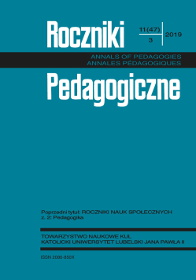Professional Counseling for People 50+ with Special Consideration of the Age Management in the Human Resource (Hr)
Main Article Content
Abstract
Career guidance for older workers is today not only an essential part of lifelong learning and an instrument of active labour market policy in EU countries, but also of AGE management in enterprises. It is important to orientate oneself towards scientific models of the life phases, which do not only refer to the professional or company area. Therefore, holistic counselling approaches that also take into account the quality of life of working people are of great importance. In our view, the life phases and role concepts D. Super and their further development through approaches of “life design” M. Savickas et al. are suitable for methodical design. In this article, concrete proposals for age-appropriate human resource management are also made.
Article Details
References
Arbinger, R. (1999). Entwicklungspsychologie des Jugendalters. Landau: Verlag Empirische Pädagogik.
Baltes, P.B., Baltes, M.M. (1990): Psychological perspectives on successful aging: The model of selective optimization with compensation. In: P.B. Baltes & M.M. Baltes (Eds.), Successful aging: Perspectives from the behavioral sciences (s. 1-34). New York: Cambridge UP.
Bellmann, L., Dummert, S., Leber, U. (2018). Konstanz altersgerechter Maßnahmen trotz steigender Beschäftigung Älterer. WSI-Mitteilungen 2018, s. 20-27.
Braun, S. (2018). Marketing für berufsbezogene Weiterbildung Älterer aus betrieblicher Sicht – Eine empirisch-kasuistische Studie. Masterarbeit Universität Mannheim
Bundesministerium für Familie, Senioren, Frauen und Jugend (BMFSFJ) (2011). Monitor Engagement – Wie und wofür engagieren sich ältere Menschen? Ausgabe Nr. 4.
Czepek, J., Moczall, A. (2017). Neueinstellung Älterer – Betriebe machen meist gute Erfahrungen. Institut für Arbeitsmarkt- und Berufsforschung, IAB-Kurzbericht 8/2017.
ERASMUS-Projekt INCounselling 50+: Project presentation on HdBA page.
Ertelt, B.-J., Frey, A. (2014). Berufsentwicklung und Lebensqualität. In: A. Wudarski (ed), Quaestiones de Qualitate Vitae (Auf der Suche nach Lebensqualität) (s. 303-320). Frankfurt/ Oder, Osnabrück, AJD Częstochowa.
Ertelt, B.-J., Imsande, A., Scharpf, M. & Walther, Th. (2018). Arbeit, Leben, Teilhabe ab 55 – Trainingsmodule für Beratende. Bielefeld: Media GmbH & Co. KG.
European Centre for the Development of Vocational Training (CEDEFOP) (2015). Increasing the value of Age – Guidance in employers‘ Age Management strategies. Research Paper Nr. 44. Luxembourg: Public Office of the European Union.
European Foundation for the Improvement of Living and Working Conditions (Eurofound) (Hrsg.) (2018). Labour market change – State initiatives supporting the labour market integration of older workers – Not finished at 50: Keeping older workers in work.
European Lifelong Guidance Policy Network (ELGPN) (2015). Guidelines for Policies and Systems Development for Lifelong Guidance – A Reference for the EU and for the Commission. Tools No. 6.
European Lifelong Guidance Policy Network (ELGPN) (2015). Leitlinien für die Entwicklung politischer Strategien und Systeme lebensbegleitender Beratung –Ein Referenzrahmen für die Länder der Europäischen Union und für die Europäische Kommission. Tools No. 6.
Frey, A., Ertelt, B.-J. & Ruppert, J.-J. (2017). Berufsbiografien im Vergleich – Modul 7 für den Masterstudiengang Arbeitsmarktbezogene Beratung (M.A.). Mannheim: Hochschule der Bundesagentur für Arbeit.
Frey, A., Ertelt, B.-J., Ruppert, J.-J. (2018). Diagnosis of Social, Methodical, and Personal Competencies in Vocational Training and Job Analysis. A German Perspective. In: A. Biela (ed.), European Questionnaire for Job Analysis (EQJA) – Theoretical and Methodological Bases (s. 101-127). Berlin: Peter Lang GmbH.
Froidevaux, A., Baumann, I., Maggiori, Chr., Weber, F., Rossier, J. (2017). Retirement Planning. How to Deal with Different Adjustment Trajectories? In: B.J. Ertelt, M. Scharpf (Hrsg.), Berufliche Beratung Älterer (s. 25-53). Frankfurt am Main: Peter Lang.
Graf, A. (2001). Lebensorientierte Personalentwicklung – Ein Ansatz für die Erhaltung und Förderung von Leistungsfähigkeit und – bereitschaft während des gesamten betrieblichen Lebenszyklus. Management, nr. 3, s. 24-31.
Graf, A. (2002). Lebenszyklusorientierte Personalentwicklung. Ein Ansatz für die Erhaltung und Förderung von Leistungsfähigkeit und -bereitschaft während des gesamten betrieblichen Lebenszyklus. Bern–Stuttgart–Wien.
Hafkesbrink, J., Krause, M. (2017). Age-Management – Den demografischen Wandel in Unternehmen gestalten. Freiburg–München–Stuttgart: Haufe Gruppe.
Herr, E.L., Cramer, St.H., Niles, Sp.G. (2004). Career Guidance and Counseling Through The Lifespan – Systematic Approaches. 6th ed. Boston: Pearson.
Homrighausen, P., Wolf, K. (2018). Wiederbeschäftigungschancen Älterer – Wo Vermittlungsfachkräfte Handlungsbedarf sehen. Institut für Arbeitsmarkt- und Berufsforschung, IAB-Kurzbericht, nr 11.
Lambeck, M. (2008). Lebensorientierte Personalarbeit – Die personalpolitische Antwort der DekaBank auf den demografischen Wandel. 54. IW-Studiengespräch zur beruflichen Bildung am 02.06.2008.
Maggiore, C., Nihil, R., Froidevaux, A., Rossier, J. (2014). Development and validation of the transition to retirement questionnaire. Journal of Career Assessment, 22, 505-523,
Mandl, I., Patrini, V., Jalava, J. Lantto, E. Muraille, M. (2018). Labour market change – State initiatives supporting the labour market integration of older workers – Not finished at 50: Keeping older workers in work. European Foundation for the Improvement of Living and Working Conditions (Eurofound) (Hrsg.).
Nota, L., Rossier, J. (eds.) (2015). Handbook of Life Design – From Practice to Theory and From Theory to Practice. Göttingen: Hogrefe Publishing GmbH.
Organisation for Economic Co-operation and Development (OECD), European Communities (2004). Career Guidance – a Handbook for Policy Makers.
Savickas, M.L. (2005). The theory and practice of career construction. In: S.D. Brown, R.W. Lent (Eds.), Career development and counseling: Putting theory and research to work (s. 42-70). Hoboken, NJ: Wiley.
Savickas, M.L. et al. (2011). Life-designing: Ein Paradigma für die berufliche Laufbahngestaltung im 21. Jahrhundert. Zeitschrift dvb-forum 1/2011 (Ertelt, B.-J., Ruppert, J.-J.: Deutsche Übersetzung und Anpassung des englischen Originalartikels 33-47).
Savickas, M.L., Nota, L., Rossier, J., Dauwalder, J.-P., Eduarda Duarte, M., Guichard, J., Soresi, S., Van Esbroeck, R. & van Vianen, A.E.M. (2009): Life designing: A paradigm for career construction in the 21st century, Journal of Vocational Behavior, 75(3), 239-250.
Schlossberg, N.K. (2003). Retire smart, retire happy: Finding your true path in life. Washington DC: American Psychological Association.
Walker, J.W., Kimmel, D.C., & Price, K.F. (1981): Retirement style and retirement satisfaction: Retirees aren’t all alike. International Journal of Aging and Human Development, 12, 267-281. In: Herr, Cramer, Niles 2004, s. 535.

